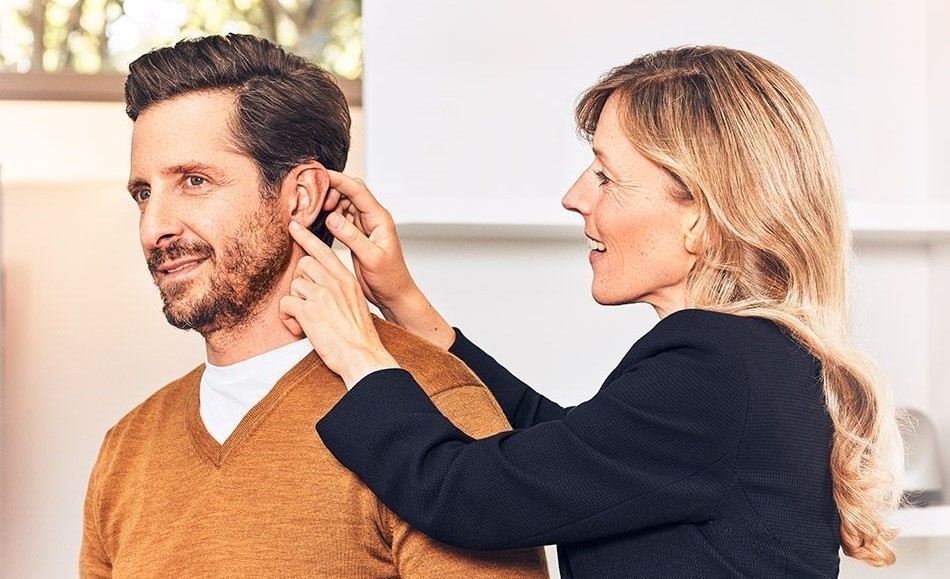
Adjusting to New Hearing Aids
Tips on how to adjust to your new hearing aids
| Hearing Aid UK 17/02/2026 Update |
Getting used to hearing aids
Adjusting to hearing aids involves acclimating to new sounds and increased auditory input. Initial discomfort is common, but regular use and patience help. Gradual adaptation, consistent wear, and follow-up visits with an audiologist improve comfort and performance, enhancing hearing and overall quality of life.
Most people adjust within 2-4 weeks, though everyone's journey is different. You're not alone in this - we provide lifetime support at no extra cost, including free home visits if needed.
On this page, we take a look at some common problems around the adjustment period and how to make adjusting to new hearing aids easier, as well as other useful information to support you on your hearing loss journey.
Is there an adjustment period to wearing hearing aids?
So, you're wearing your new hearing aids - what happens next? You might be getting along perfectly with your hearing devices, or you might be feeling a bit lost or even overwhelmed. Whatever you're feeling, it's completely normal. The sound you hear will sound weird at first, but give yourself time to adjust.
Things like your own voice, the rustle of paper, or even your footsteps might sound surprisingly loud or strange - this is your brain relearning sounds it had forgotten.
Your audiologist is there for you even after you leave the clinic. In many ways, the aftercare service is more important than your initial consultation, as this is where you are experiencing your new soundscape in your most realistic environment.
That's why all our aftercare is included for life - unlimited adjustments, no appointment fees, and home visits available if travelling is difficult.
Adjusting to hearing aid use - Audiologists are there to support you
Many are surprised to find out that it can take a while to get used to their hearing aids. This is even more true for those who have never worn them before. Combined with understanding how they work, you'll also have times when your brain needs to remember sounds.
This is common that your device might need several adjustments before it suits your everyday soundscape. Audiologists have the skills and experience to support you and answer any questions you may have at any time.
They are there to support your understanding of your hearing devices, and you should never put off arranging an appointment to ask any questions you may have during the adjustment period.
Keep in touch with your audiologist, and if your aids need a little tweak, they can do this for you, either in a clinic or remotely in most cases. Don't worry about "bothering" us with questions - helping you through this adjustment period is precisely what we're here for, and it's all included in your hearing aid price.
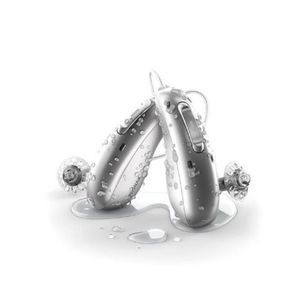
Hearing aid adjustment period - Will I get used to my hearing aids straight away?
Hearing loss is different, and some people will need some time to adapt to wearing new hearing aids. This is even more common if you've lived with untreated hearing loss for some time. You might be wondering why this is the case. Your brain has to get used to your hearing aids, too.
If you've had hearing loss for years, your brain has essentially "forgotten" how to process certain sounds. It needs time to relearn - typically 2-4 weeks of consistent wear.
During this period, your brain is getting used to all the new sounds you're experiencing that you might have forgotten about because of auditory deprivation. In all cases, your audiologist should advise and instruct you on how to use, care, and maintain your devices and hearing care success going forward.
Your own voice may sound weird at first
Your new hearing aids will not duplicate how you used to hear before you were diagnosed with hearing loss, especially your own voice. This means your voice might sound weird and unfamiliar to you initially. You also might be more aware of your swallowing and chewing whilst wearing them.
Many people describe their voice as sounding "echoey" or "like talking in a barrel" at first - this is completely normal and usually resolves within the first week. All these funny new sounds will switch to the new normal the more you are on your devices.

Adjusting to a new hearing aid
Headaches with new hearing aids? Or are your new hearing aids giving you itchy ears?!
Coping with new hearing aids, for some people, might not be a simple task. Other than being patient and accepting the adjustment period, there are usually no side effects to wearing new hearing aids.
Your digital hearing aids should be comfortable, even though you know you are wearing them.
Coping with new hearing aids takes time, however, there are a few problems that you shouldn't put up with.
Your new hearing aids shouldn't be painful, or give you a headache, and they shouldn't make your ears bleed, feel irritated, or sore. Other issues might be:
- My new hearing aids give me dizziness
- My new hearing aids itch
- My new hearing aids hurt my ears
- My new hearing aids are too loud

Hearing aid side effects
Are there any side effects to wearing new hearing aids?
If you are experiencing any of these side effects, you should remove your hearing aids and contact your audiologist to adjust the fit of your devices as soon as possible. You should also see your audiologist if new sounds cause you pain, as your device's settings might need changing.
Remember that hearing aids won't give you perfect hearing, as hearing aids aren't a cure for hearing loss. They are designed to simply make you hear better and give you a greater quality of life.
Ok, I'm now used to my new hearing aids, what happens next?
When you get used to wearing your hearing aids, you should wear them all the time - apart from when you're showering, swimming, etc. If you don't wear them consistently, you can prolong the adjustment period and are at risk of not getting used to them at all.
Your brain also craves the stimulation of your new soundscape. While research is continuing, it does tell us that wearing hearing aids can reduce the risk of cognitive decline, loneliness, depression, and anxiety.
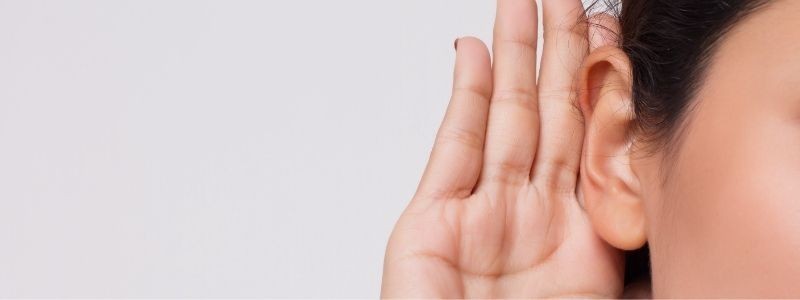
Adjusting to New Hearing Aids
Useful tips on how to adjust to your new hearing aids
New hearing aid tips from our audiologists
Adapting to new hearing aids begins by wearing your hearing aids at home and discovering your new soundscape in quiet hearing environments. Get used to one-to-one conversations and tell others to support you through more challenging listening atmospheres. Talk out loud as much as you can to recognise and get used to your own voice with your devices.
Challenge yourself and organise follow-up appointments
Listen to audiobooks and also push yourself to figure out which direction sounds are coming from. Stick with regular appointments with your audiologist. These can be used to get answers to any queries or to make adjustments with your audiologist.
Your audiologist can also arrange at-home services if needed. We include a follow-up appointment within the first 2-3 weeks as standard, with unlimited additional appointments if you need them.
Be patient and make sure you are comfortable
Because you are not used to your new soundscape, your brain isn't either. So new sounds and background noises will initially feel and sound strange. Your brain needs to get used to organising and recognising sounds again. Be patient and anticipate the changes.
If your new hearing aids are causing you pain, arrange an appointment to see your audiologist to alter the fit and adjust any settings accordingly. Please be aware that your ears might be sensitive to the new devices at first - it's all a part of your adjustment period. Mild awareness of the aids in your ears is normal; actual pain is not - contact us immediately if you experience discomfort.
Take time for breaks and rest
Initially, you might find that wearing them for a few hours a day might help with the adjustment period, especially in more challenging environments. After that, you can steadily wear them for longer until you reach a point when you are used to wearing them.
This period of adjustment can be very tiring, so you must remember to rest and take time out. It is very similar to retraining a muscle to do something that it hasn't been used to doing in a while.
Start with 2-3 hours daily in quiet environments, gradually increasing to 6-8 hours over the first week, then full-day wear by week two. Listen to your body - if you feel exhausted, that's your brain working hard to readjust.

A Hearing Aid User's Guide to Hearing Better
Plus, how can loved ones help?
Hearing aid users' feedback
Those with hearing loss who wear digital hearing aids provide feedback to our audiologists that they see a huge increase in their quality of life. Hearing better enables them to get the most out of life, experiencing enhanced interactions with family and friends as well as more enjoyable social gatherings.
Where they struggled to hear in crowds and noisy environments, they now have a full soundscape, enabling them to engage in conversation more easily and with less effort and listening fatigue wherever they are. Appreciating and 'getting excited' about social events instead of worrying whether or not they can follow the conversation.
A guided transition
Whether you're new to hearing aids or have upgraded your old ones, it's important to know that not everyone's transition to wearing hearing aids is seamless or straightforward. It can take some time to get used to wearing hearing aids and appreciating your new soundscape. This is all completely normal, and your audiologist will be there to support you.
Your audiologist will also schedule a follow-up appointment where you can take time to adjust and fine-tune your hearing aids based on your hearing experiences since you started wearing them. Your audiologist will answer any questions and issues you may have, and together you can find the best solution.
Remember: you have a 60-day money-back guarantee. This gives you proper time to adjust without pressure - if they're genuinely not right for you, we'll find a better solution or provide a full refund.
When your loved one starts to wear a hearing aid, how can you help?
There are quite a few things that you can do to support your loved ones as they get used to their new hearing aids. One of the main things is being patient and being there for moral support, but you can also help by:
Educating yourself about hearing loss
If you know more about hearing loss, hearing accessories, how to change batteries, and the benefits of hearing aids, you will help your loved one adjust, and you can give them more confidence in wearing them. For example, how to change batteries, when and how to clean them, and what hearing aid accessories they might benefit from.
They will feel less alone, as you are part of their journey. If you show support and develop a strong alliance with your audiologist, you will motivate your loved one through communication, better awareness, and advice.
Family members are welcome at all appointments, whether in clinic or during home visits - two pairs of ears remembering the advice is better than one.
Attend appointments
There can be a few follow-up appointments initially, one is sometimes to adjust hearing aid settings after the first couple of weeks. Being present at appointments can reduce stress for the hearing aid wearer, and you can share the complexities that hearing loss sometimes brings.
Making the right decisions for their hearing is often a daunting task with many variances to consider. It involves scheduling appointments, receiving and understanding advice, making choices that are right for them, implementing the advice given, and maintaining hearing health. Therefore, family involvement is often crucial.
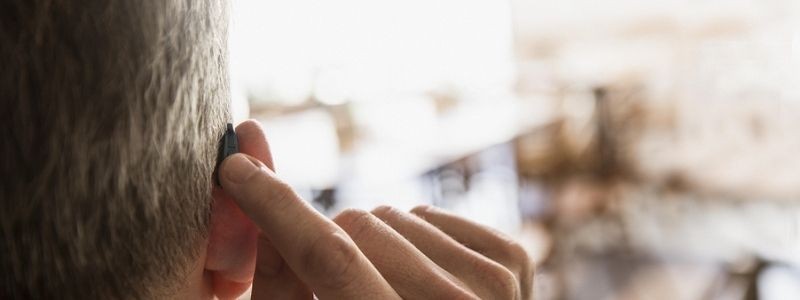
How to get the most out of your hearing aids
Quick tips for getting used to hearing aids
1. Wear them!
It may sound obvious, but you must wear your hearing aids frequently to receive the full benefits they offer. This can sometimes feel like a challenge if your hearing aids don't feel comfortable to wear right away. At the start, you might be constantly aware that they are in your ears, but that feeling will go away in a few days.
Like with all new things, it takes time to adjust and add to your existing daily routine. For instance, it is common for some people to forget to put in their devices at the beginning. Some of our patients initially found it beneficial to set an alarm in the morning and at night to remind them to put in and take out their hearing aids.
Soon you'll develop your new natural soundscape and start to recognise and appreciate the simple things in your everyday life that you might have missed or not heard in a while - like running taps and those annoying creaky stairs! Birds singing, the click of your kettle switching off, rain on windows - these "rediscovered" sounds often bring genuine joy.
The sounds you hear might be unnaturally loud at the beginning, and this is simply due to the brain not being used to them. This won't last for long, as your brain adjusts to the more focused and clear sounds you are now experiencing.
2. Keep talking
Speaking to people either on the phone or face-to-face will be extremely rewarding when you wear your hearing aids. Speech and sound are clear, focused, and easier to follow - something that you may not have experienced before or not at the level you have been used to in the past.
Get into the habit of starting conversations that you might have avoided before with your hearing loss and see how your confidence improves as you build stronger social connections with family and friends. Having regular conversations with your family or friends is of great benefit, as they are the easiest to identify, and you can acknowledge and get used to the higher level of focused hearing you now get with your devices.
Please remember that when you are in loud or more challenging environments, don't be tempted to adjust the volume as your hearing aids should adjust automatically - there is no need for manual manipulation. You can also damage your ears by doing this if the volume is manually turned up too loud.
3. Make a note
Taking note of your new hearing experiences whilst wearing your hearing aids can be a great tool to track your challenges, new impressions and also to see how far you've come. More importantly, it is a physical report that will help guide your audiologist to make any adjustments needed.
These could be new sounds you've not experienced before, unpleasant hearing situations in various environments, and maybe how comfortable your hearing aids are and so on. The more sounds you can recognise and filter out, and the more sounds you identify as bothersome, can ultimately help your audiologist make the right tweaks that will give you a more personalised sound. Even simple notes like "fridge humming too loud" or "struggled in café yesterday" help us fine-tune your aids perfectly for your life.
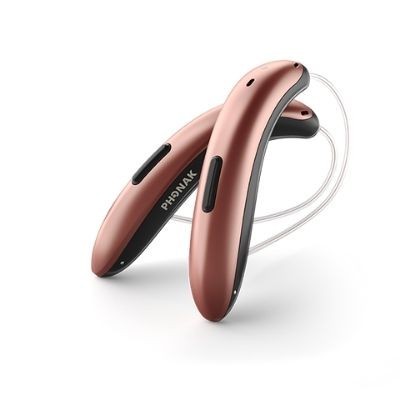
Quick links to other useful information regarding hearing aid maintenance:
Are you getting the most out of your hearing aids?
The key takeaway here is to give your brain time to receive these new sound signals that it has been missing.
This is called auditory confusion. Your brain simply needs time to familiarise itself with the various frequencies of speech, sound, and background noises of everyday life.
You may be looking for an audiologist local to you, thinking about upgrading your existing hearing aids, or have some questions about this page, hearing loss, or hearing healthcare - call us free on 0800 567 7621 for free impartial advice.
What's included in our hearing aid prices?
Our specialist service includes:
Do not spend hundreds of pounds without getting a second opinion from us.
Please call us on 0800 567 7621
 Not only are the prices great, but the service is fantastic! Many thanks to your team.
Not only are the prices great, but the service is fantastic! Many thanks to your team.Other pages you might find useful
FAQs
In general, any audiologist will always recommend to you the hearing aid model that best suits your needs. Here is a useful checklist to make sure that is the case.
- Audiologist's level of knowledge: The audiologist you have seen will hopefully have a wide knowledge of all available hearing aids; however, some will only be familiar with a small number of brands and, therefore, may not really be in a position to know which model is the best for you. It is OK to challenge their recommendation and ask them to justify why this particular brand is the one for you.
- Do research: Read about the hearing aid that was recommended. Does it seem like it will suit your lifestyle? Does it have more or fewer features than you need?
- Be aware of sales targets: Many high street retailers have specific tie-ins to a particular manufacturer/brand. The hearing aid they have suggested may still be the correct one for you, but do your research so that you know why they might have recommended it.
If you have significant hearing loss in both ears, you should be wearing two hearing aids. Here are the audiological reasons why:
Localisation: The brain decodes information from both ears and compares and contrasts them. By analysing the minuscule time delays as well as the difference in the loudness of each sound reaching the ears, the person is able to accurately locate a sound source.
Simply put, if you have better hearing on one side than the other, you can't accurately tell what direction sounds are coming from.
Less amplification is required: A phenomenon known as “binaural summation” means that the hearing aids can be set at a lower and more natural volume setting than if you wore only one hearing aid.
Head shadow effect: High frequencies, the part of your hearing that gives clarity and meaning to speech sounds, cannot bend around your head. Only low frequencies can. Therefore, if someone is talking on your unaided side, you are likely to hear that they are speaking, but be unable to tell what they have said.
Noise reduction: The brain has its own built-in noise reduction, which is only really effective when it is receiving information from both ears. If only one ear is aided, even with the best hearing aid in the world, it will be difficult for you to hear in background noise as your brain is trying to retain all of the sounds (including background noise) rather than filtering them out.
Sound quality: We are designed to hear in stereo. Only hearing from one side sounds a lot less natural to us.
Fancy some further reading on this topic? You can read about why two hearing aids are better than one in our article, hearing aids for Both Ears, here
For most people, the main benefit of a rechargeable hearing aid is simple convenience. We are used to plugging in our phones and other devices overnight for them to charge up. Here are some other pros and cons:
For anybody with poor dexterity or issues with their fingers, having a rechargeable aid makes a huge difference, as normal hearing aid batteries are quite small and some people find them fiddly to change.
One downside is that if you forget to charge your hearing aid, then it is a problem that can't be instantly fixed. For most, a 30-minute charge will get you at least two or three hours of hearing, but if you are the type of person who is likely to forget to plug them in regularly, then you're probably better off with standard batteries.
Rechargeable aids are also a little bit bigger and are only available in Behind-the-Ear models.
Finally, just like with a mobile phone, the amount of charge you get on day one is not going to be the same as you get a few years down the line. Be sure to ask what the policy is with the manufacturer's warranty when it comes to replacing the battery.
For most people, the answer is yes. But it's never that simple.
The majority of hearing problems affect the high frequencies a lot more than the low ones. Therefore, open fitting hearing aids sound a lot more natural and ones that block your ears up can make your own voice sound like you are talking with your head in a bucket. Therefore, in-ear aids tend to be less natural.
However, the true answer is we can't tell until we have had a look in your ears to assess the size of your ear canal, and until we have tested your hearing to see which frequencies are being affected.
People with wider ear canals tend to have more flexibility, also there are open fitting modular CIC hearing aids now that do not block your ears.
There is also the age-old rule to consider, that a hearing aid will not help you if it's sat in the drawer gathering dust. If the only hearing aid you would be happy wearing is one that people can't see, then that's what you should get.
Most people can adapt to any type of hearing aid, as long as they know what to expect. Have an honest conversation with your audiologist as to what your needs are.
Generally speaking, six or more. Unless it's none at all. The number of channels a hearing aid has is often a simplistic way an audiologist will use to explain why one hearing aid is better than another, but channels are complex, and it is really not that straightforward. Here are some reasons why:
Hearing aids amplify sounds of different frequencies by different amounts. Most people have lost more high frequencies than low, and therefore need more amplification in the high frequencies. The range of sounds you hear is split into frequency bands or channels, and the hearing aids are set to provide the right amount of hearing at each frequency level.
Less than six channels, and this cannot be done with much accuracy, so six is the magic number. However, a six-channel aid is typically very basic with few other features and is suitable only for hearing a single speaker in a quiet room. The number of channels is not what you should be looking at; it's more the rest of the technology that comes with them.
As a final note, different manufacturers have different approaches. One method is not necessarily better than any other. For example, some manufacturers have as many as 64 channels in their top aids. Most tend to have between 17 and 20. One manufacturer has no channels at all.
Manufacturer's warranties typically last between 2-5 years, depending on the brand and model, and cover defects in materials and workmanship. This includes repairs for component failures, electronic malfunctions, and manufacturing defects, but excludes damage from misuse, accidents, or normal wear. Most manufacturers also include loss and damage insurance for the first year.
We handle all warranty claims on your behalf, liaising with manufacturers and ensuring you get replacement devices quickly when needed. This comprehensive warranty coverage, combined with our lifetime aftercare, gives you complete peace of mind.
Our hearing tests are completely free, whether at our clinics or in your home. Unlike other providers who charge £30-£100 for home visits, we believe hearing healthcare should be accessible without financial barriers. Our comprehensive assessments include examination by a registered audiologist, audiogram results, and personalised recommendations.
All testing, future adjustments, and ongoing support are included at no extra cost. While NHS tests are also free, typical 6-week waiting periods often lead people to seek immediate private testing. We provide prompt, professional assessments that fit your schedule and budget.
Yes, we offer completely free home visits throughout the UK, and this service is included in our prices with no additional charges. Home visits are particularly valuable for people with mobility issues, busy schedules, or those who simply prefer the comfort and convenience of their own environment.
Our audiologists can conduct full hearing tests, fit hearing aids, and provide ongoing support in your home. This service sets us apart from many providers who either don't offer home visits or charge extra for them.
We can offer prices up to 40% lower than high street retailers because of our business model. As a network of 200+ independent audiologists, we don't have the massive overheads of large retail chains - no expensive high street premises, no sales targets pushing audiologists to sell the most expensive options, and no costly marketing campaigns.
However, we maintain the same buying power as the big chains because we purchase on behalf of our entire nationwide network. This means you get access to the same premium hearing aids with professional service, but at genuinely competitive prices.
We offer a comprehensive 60-day money-back guarantee, which gives you twice the industry standard time to properly assess whether your hearing aids are right for you. This extended period recognises that adjusting to hearing aids takes time, and your brain needs several weeks to adapt to the amplified sounds.
Unlike many providers who offer just 30 days, we believe 60 days gives you the confidence to test your hearing aids in all the situations that matter to you - from quiet conversations at home to busy restaurants and outdoor activities.
Ask the Experts
6 Morton Lane
Walkwood
Redditch
Worcestershire
B97 5QA
Latest Launch
When we refer to a product as 'Latest Launch', we mean it is the latest to be released on the market.
New
When we refer to a product as 'New', we mean that the product is the newest hearing aid model on the market.
When we refer to a product as 'Superseded', we mean that there is a newer range available which replaces and improves on this product.
Older Model
When we refer to a product as an 'Older Model', we mean that it is has been superseded by at least two more recent hearing aid ranges.
